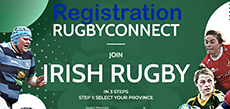Born in 1911 in Nenagh and educated at Pres Bray, where Bill started showing his abilities at rugby and was selected for Leinster Schools against Connacht + Munster in 1928-29.
He moved to Cork and studied Engineering at UCC and joined Dolphin where he won a Munster Senior Cup medal in 1930-31.
He received a scholarship to study aeronautical engineering at the London College of Aeronautical Engineering. Having qualified 2nd in his class he opted for a commission in the RAF . He joined in October 1933 and started learning how to fly. A year later he had earned his wings and was confirmed as a pilot officer, flying fighters and then Flying Boats.
At that time he was spending as much time playing rugby as he did flying, playing for London Irish, RAF and Hampshire. It was the rugby and not the flying had him in hospital three times with broken bones in the following year.
He represented the RAF at rugby and boxing and then took an interest in squash and played it to a high level. After a few pints one evening in Spring 1935 in the isle of Wight where he was based he learned another flying boat was missing. He and a crew mate realised they had seen the other boat and they were waving at them. They went to their CO to tell him what they knew.
They offered to fly back, the CO said, are you playing rugby for the station tomorrow, without you Igoe we will probably lose so you are staying here. He played the following day but never flew a flying boat as he was injured in the game and when he was released from hospital he was sent back for a refresher course on a single seat fighter. His next game of rugby was for the RAF in Egypt.
In September 1935 he was back in Essex, back at out half for London Irish first side, he was offered a place in the final Irish Trial but was unable to attend due to service commitments. According to his son Brian in his book “To fly is everything” It cost him an Irish cap, the man who was picked for Ireland was playing on the London Irish 2nd team.
He was very lucky in 1937 to walk away from a plane crash, the plane had been on fire, he rolled in the grass to put out the flames on his clothes. He had significant 3rd degree burns and it was touch and go and he spent four months in hospital.
In the 1938/39 season he was vice captain of London Irish, nine of the team were lost in the 2nd World War.
He went from flying officer to Squad Leader in 54 weeks. He had another close encounter in 1940 at RAF Biggins Hill, there was a bombing raid going on and he and a flight sergeant approached the gate by car from different directions. It was his right of way, but he waived Bill through. Bill acknowledged it and insisted the sergeant go through first. He did and as soon as he went through the gate his car was hit by a bomb and he was killed.
Each season, London Irish present an honours tie to a back and a forward for each team, Bill was the backs winner in 1946-47, the first time it had awarded in eight years due to the war. He was Senior captain in 1949, when 38, he retired from playing two years later.
He turned his sporting interest to golf and in 1959 was a winner of the Gleneagles Hotel Foursomes, a tournament that Christy O’Connor Snr won three years later.
He started a tea plantation in Rhodesia, which would end up employing 5,000 people. He died in 1993 aged 82.

